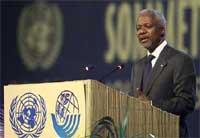Text written in Basque and translated automatically by Elia without any subsequent editing. SEE ORIGINAL
Summit without great surprises in Johannesburg
The Johannesburg Sustainable Development Summit has concluded, as expected, without major agreements. The action plan agreed upon by the Heads of State of the world after ten days of work has resulted in criticism from non-governmental organizations, which consider that the agreements reached do not serve to put sustainable development of the world before the economic interests of the rich in poverty.
The main results of the Johannesburg Summit are:
- Energy. The Plan of Action refers to a greater use of renewable energy, but not to mention objectives and deadlines. The European Union proposed solid and concrete commitments in favour of renewable energy, which reached 15% of total production by 2010, but did not succeed. Following their refusal, EU countries have announced that they will boost their renewable energy support programme to 10% of total renewable energy consumption in 2010.

- Chemical products. Create a working group by 2020 to reduce the impact of chemicals on health and the environment.
- Biodiversity. Agreement for the significant reduction of biodiversity loss by 2010. No concrete objectives are established.
- Natural resources. Establish national strategies to achieve a change in the tendency to degradation of natural resources.
- Water and sanitation. Currently there are 1.1 billion people without drinking water and 2.4 billion without sanitation in the world. Halve the amount by 2015.
- Climate change. Russia, Canada and China commit to ratify the Kyoto protocol. Therefore, it may enter into force. Undoubtedly, one of the most cheerful news that has left Johannesburg.
- Production and consumption. Establish a framework to promote national programmes that guide production and consumption processes towards sustainability.
- Right to work. References to the agreements of the International Labour Organization.
- Trade and globalization. Ratification of pre-existing agreements, but the World Trade Organization will have no environmental priority.
- Fishing. Create a network of marine protected areas by 2012 and commit to recover lost marine reserves by 2015.
- Governments. Commitment to betting on systems based on democracy and law as the basis of sustainable development. Many rich countries have proposed limiting subsidies to countries with a democratic system.
- Social Fund. The Social Fund for Development is created.
Buletina
Bidali zure helbide elektronikoa eta jaso asteroko buletina zure sarrera-ontzian








